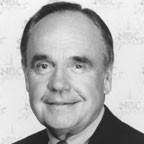|
Dick Enberg Inducted into Indiana University's Athletics Hall of Fame
In a broadcasting career spanning five decades, Enberg has become a legend in the business, having won 14 Emmy Awards and served as the play-by-play voice for everything from the Super Bowl to the World Series to the Masters to the Breeder's Cup. All of which came after honing his craft as a Hoosier. While earning his master's and doctoral degrees in health and physical education at Indiana, Enberg helped establish the IU Sports Network, calling Indiana football and basketball games at just 22 years old. "Mr. Dick Yoakam had just arrived from Iowa as a new member of the journalism staff, and he inspired the birth of the IU Sports Network," Enberg said. "And I happened to arrive on campus the same time that he did, and when the sign went up for the auditions, I applied and was fortunate to be able to win the position as the play-by-play announcer on that very first IU Sports Network staff." The rest, as it so often said, is history. After four years of calling games for the Hoosiers and with two IU degrees in hand, Enberg moved to California, where he taught health education and coached baseball at what is now Cal State Northridge. But his broadcasting career was hardly behind him. Enberg would go on to call games for UCLA basketball, the Angels and the Rams, eventually leading to a 25-year career with NBC before moving over to CBS in 2000. One of Enberg's most defining traits is his signature phrase, "Oh my!" which has its own unique niche in Hoosier lore. Enberg adopted the phrase while calling IU basketball games in the late 1950s and early 1960s, and what started as a simple exclamation about an Indiana fast break quickly took on a life of its own. "After trying out `Oh my!' some of the guys in the dorm after a couple of weeks would greet me with, `Hey Enberg, oh my!'" Enberg said. "So I thought, `Yeah, that's it. It's going to work.' And it's been a lifelong friend. I've used it in every sport and every broadcast, basically, as an exclamation point, and it has served me well. Whenever I can't think of anything else to say, `Oh my!' covers a tremendous amount of territory." While Enberg is still going strong on the broadcasting front, he hasn't forgotten what brought him to Indiana in the first place. And when his career in front of the camera ends, he'd like his career in the classroom to begin anew. "When I decide to hang up the microphone, I would like very much to go back to a college campus, a university campus, and teach classes in broadcast journalism, particularly in sportscasting," he said. "I loved my time teaching at Cal State Northridge, and a couple of years I taught at Indiana as a graduate assistant. I want to give back, and I think I have a lot to share, and I'm eager to have that opportunity someday." "I think that I'm not deserving," he said. "I'm not an athlete. I wanted to be one. If indeed they were swayed in their voting process by the fact that they knew that I always wanted to be an athlete - I'm kind of frustrated that I wasn't very good ¬- then maybe they gave the extra points for my dreams. It's interesting, my friends, as I grew up, went through my educational years, used to laugh, because they'd say, `Enberg, you always thought you'd be a good athlete, but you only talked a good game.' But I guess it worked out okay. It worked out quite nicely." To say being behind the microphone instead of in uniform "worked out okay" is a gross understatement, and Enberg has never forgotten the place that helped him get his start, speaking at IU commencement and helping fund the Dick Enberg Distance Learning Studio at the School of Health, Physical Education and Recreation. "Without the experiences and the educational care, if you will, of the university and its wonderful professional staff of educators, I wouldn't be what I am today" Enberg said. "Maybe the shortest way of saying that is Indiana University accepted me as a very raw graduate student, and four years later with a master's and doctorate, took a nobody and allowed me to be somebody." |
